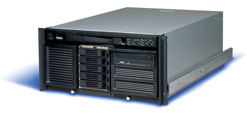
|
| Personal background |
|---|
In Short...
Intel Server
• Intel SR5000 Rackmount System Chassis
- dual power supplies
• Intel STL2 Motherboard
• Dual P3-1GHz (256K Cache)
• 1GB SDRAM PC133
• System/Application Array:
- Adaptec 3210 Controller
- 4x ST336705LC drives in RAID5
Details...
Put together in summer 2001 by a team of engineers at DV411.com, in Los
Angeles CA.
Primarily responsible for being a file and an Exchange server for a small
business 5 people large.
|
| Thoughts about SETI and SETI@home |
|---|
1. Extraterrestrial life does exist. I mean, what other choice does it have? Humans will discover and prove that extraterrestrial life exists, on Wednesday, June 3, 2026, when SETI@home subscribers start receiving emails containing instructions to low power antigravitational devices, and other suggestions on what to do instead of listening to the skies in search of ETs. POssible benefits: flying toasters (really). Dangers: flying toasters.
2. Should humans transmit a beacon for others to find? Not while the humindkind still deals with bib Ladens and Saddam Huseins: or these "others" may find something unworthy of finding...
3. Why do I run SETI@home? It's a cool way to measure up against others... As in "size matters"... My views on the project: hey, it's cool! Worthy of participation just because of that "together" feeling. Which brings me to suggestions: weekly newletters with facts, tips and tricks to subscribers/participants: the fastest and the slowest systems, facts and stats about participants, more info on the screen wuth realtime results, last completed cycle time vs. slowest, fastest and average on this system, etc. |
| Your feedback on this profile |
|---|
| Recommend this profile for User of the Day: |
I like this profile |
| Alert administrators to an offensive profile: |
I do not like this profile |
|
|

